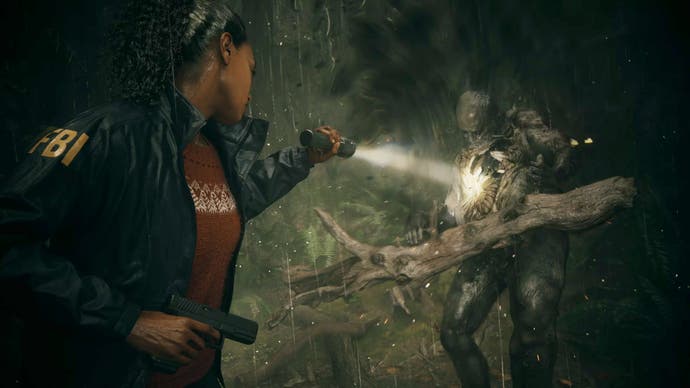Sam Lake and Remedy on Alan Wake 2's move to survival horror and pushing the franchise's boundaries
"There are no obstacles."
It's been 13 years since Alan Wake launched himself into the murky waters of Cauldron Lake in a bid to save his wife, Alice. For over a decade, he has been left languishing in the Dark Place, with surreal visions and a nightmarish hell dimension his only company. But now he is back in Alan Wake 2, Remedy's much anticipated sequel, and ready to burn the darkness away once again.
This time, however, Remedy has decided to take the series in a new direction. The developer is shaking off the action-adventure genre that came before, and is instead treading a new path - that of survival horror. But how and why did Remedy make this jump between genres? And, why now?
"Coming out of Max Payne way back when, we didn't really explore the idea of different game genres," creative director Sam Lake told me at an Alan Wake 2 press event held earlier this month. "It was kind of a given of 'ok, it's an action thing and maybe a bit more adventure put in, and some horror elements on the story side'."
However, Remedy got its fair share of criticism for the original game, with Lake telling me that many complained Alan Wake's combat was "repetitive" - and that there was simply too much of it. Therefore, when the studio did finally get the green light for a sequel, it felt it had to address these concerns, and take a different approach.
"Gamers were asking 'what is this?!'"
Another factor for the change was Alan Wake 2's focus on interactive storytelling, something Lake said needed "more ambition" than any of the studio's previous games. This time, Remedy wanted to "find ways to merge gameplay with storytelling", which is not something it had specifically done before.
"Usually the story is a separate thing that you experience, and the core gameplay is very action. So with this in mind, we were looking for solutions, and out of that suddenly came 'Hey! Survival horror!'," Lake explained, admitting the original Alan Wake's genre caused some "confusion" among players.
"Gamers were asking 'what is this?!', you know? Some called it horror, but it didn't feel like horror," he recalled. So, this time around, Remedy is being very clear with its intentions, which means less combat overall, but a lot more "atmosphere leading to the combat" that is there.
"When you are fighting, there is more variation [and] more strategic thinking as well from the perspective of resource management and limited inventory slots," Lake said. "Horror is more slow paced, and there is more creeping along and exploring, and that led to the possibility of 'we can come up with new mechanics', where we can merge the story with the game."
Lake highlighted new character Saga Anderson, and her investigations around the Pacific Northwest. Saga needs to find clues that help her solve the mysterious murders in the area, and use her Mind Place to understand what is happening around her. Similarly, Alan has his Writer's Room.
"You are actively engaged with the story," Lake explained, adding that these new mechanics felt "fitting" for the survival horror genre.
.png?width=690&quality=75&format=jpg&auto=webp)
Remedy has evidently put a lot of emphasis on this genre change, but the survival horror genre is competitive, with some top-tier examples this year alone. Still, principal narrative designer Molly Maloney believes Alan Wake 2 will stand out, as Remedy roots its games in "character".
Alan being a writer means the Dark Place can truly be a "prison of [his] own influence", she suggests. "Horror games can have a lot of shared mechanics, a lot of shared gameplay, and a lot of shared tone, but character is something really unique that [Remedy is] bringing to the table."
"From a franchise level, you know 'fight with light', 'light versus darkness', 'fiction versus reality' - I think those conceptually have allowed us to introduce mechanics that a lot of other games don't use," game director Kyle Rowley added.
"We are trying to lean on these two different power fantasies. For example, with Saga being a detective and actually doing investigative elements, and having the Mind Place, and being able to pace the game using those ideas. That is something I don't think a lot of other games utilise or have."
Rowley stated Alan Wake 2 will not be "pure horror" all the time. "I think it is important from an Alan Wake franchise perspective that we bring in those [lighter] elements, and I think that makes us kind of unique," he said.
There is, of course, also the psychological aspect of Alan Wake 2. Can Alan, and the player, ever really trust their surroundings, especially in the Dark Place? I don't have a clear cut answer and no one at Remedy would tell me, but it all adds another layer to Alan Wake 2's journey into survival horror.
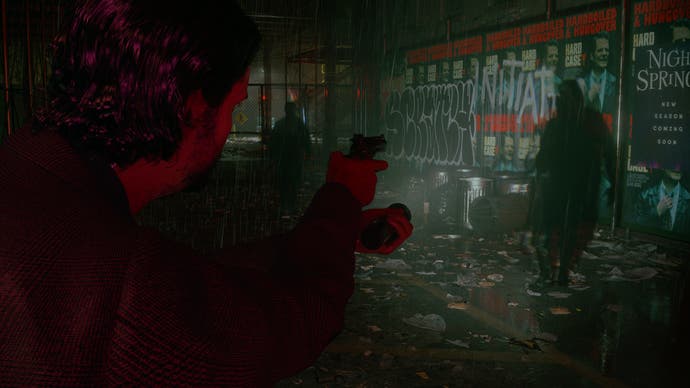
According to Lake, Remedy found the switch in genre for Alan Wake 2 liberating. "Given that [Alan Wake 2] took so long for us to actually be able to make, I felt there was all of this pent up energy of 'Oh finally! And now we'll put everything in that we think is cool'.
"And that has been a big part of this... sort of madness I feel, that allowed us to be quite bold, and push things further than I feel we have ever pushed," Lake continued. "Now it is horror, there are no obstacles, we can push it as far as we feel it needs to be pushed. Not for its own sake, but just like 'this is where the story goes'."
"We are running on many meta levels of storytelling"
Maloney highlighted Alan Wake 2's live-action sequences as one of the ways Remedy is pushing boundaries. "In our previous games we played a lot with live-action, but I feel like never before have we seen such a great opportunity to create a surreal layer as we have doing it here," she said. "The blending into the live-action adds an additional surreal uncanniness to the Dark Place that I think is really successful."
"We are running on many meta levels of storytelling," Rowley continued. "[Live-action] in the Dark Place is a good example of how we are trying to utilise it so that, contextually and narratively, it actually makes sense. We are not just doing it for the sake of doing it, it is trying to say something."
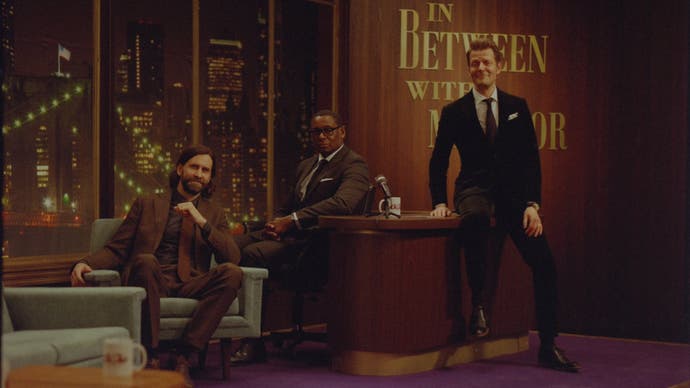
As with the original Alan Wake, the studio has been inspired by the likes of Twin Peaks and Stephen King, but for the sequel Remedy has also been influenced by crime investigation media such as True Detective and Hannibal, particularly for Saga's side of the story.
Alan's experiences, meanwhile, include hints of both Taxi Driver and Se7en, with Lake also touting Christopher Nolan's Inception as an inspiration. Remedy uses these influences to play around with Alan's own psyche, with Lake telling me the author is "not doing well" in the Dark Place.
"He had some problems already established in the first game, now they are more present... there are a lot of echoes and doubles and twisted mirrors," Lake said when I asked how Alan's mental health had inspired the direction the studio was taking.
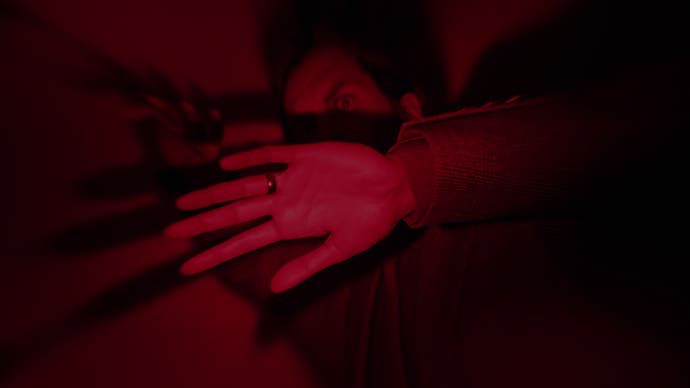
Don't panic if this all sounds like a lot to keep take in, as Remedy is keen to stress you can enjoy Alan Wake 2 without playing the original, or replaying it to refresh your memory.
"I see Alan Wake 2 as a crossover event already, from the perspective of it's really important that we keep making the statement that we wanted to create Alan Wake 2 to be a game where you don't have to have played any previous Remedy game. It needs to be approachable," Lake told me.
"As [Saga] is learning, the player is learning"
"Saga is very much the new hero character, who also doesn't know anything about the Remedy connected universe, or any of the supernatural. She is a newcomer to this, and we start playing as her at the beginning of the game, so as she is learning, the player is learning.
"That's kind of the idea, even though there are a lot of layers for our returning fans when [Alan Wake 2] gets going and you start exploring. There are a ton of connection points and threads being picked up and continued, both regarding Alan Wake and Control."
Lake told me he never wants Remedy's games to become "homework" for players. "Each and every game... needs to stand on its own feet. But I am excited that we are finding ways of tying it together nonetheless, in a very concrete way."
Remedy always establishes a game's core narrative before the developers start to weave in any story connections, Maloney and Rowley told me. Teams then swap notes and footage with each other, and the developers can then piggyback off the other's ideas (although with enough oversight that the teams don't break each other's narratives in the process).
"Obviously the connected universe is really important, but we still want it to be accessible to people. If you didn't enjoy Control, I still want you to be able to love Alan Wake," Maloney smiled.
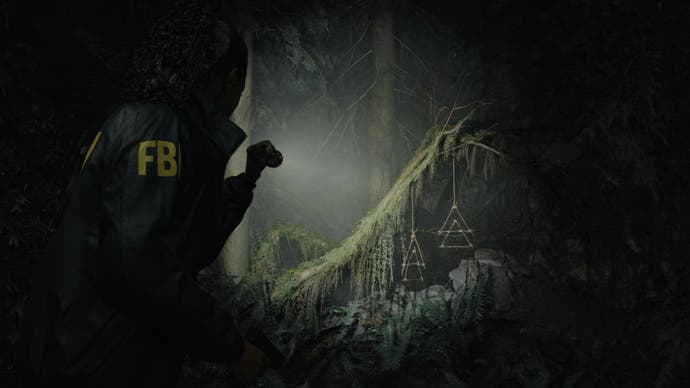
Alan Wake 2 looks set to be a goosebump-inducing, hair-raising, Se7en-inspired experience, but I am already looking to the future. After Alan Wake 2's new game plus and DLC (of which there will be two - The Lakehouse and Night Springs, both coming in 2024, which the developers tell me the team is "getting even more creative with the narrative" for), what is next for Remedy? Is the studio building up to some kind of mega endgame release, in the style of a Marvel's Avengers buddy-up?
"Maybe," Lake laughed, clearly amused. "But it took [Marvel] quite a few films, and we are just getting started. Where it goes, I don't know.
"We are very much focused on this one, and whatever comes after... well, we'll see."
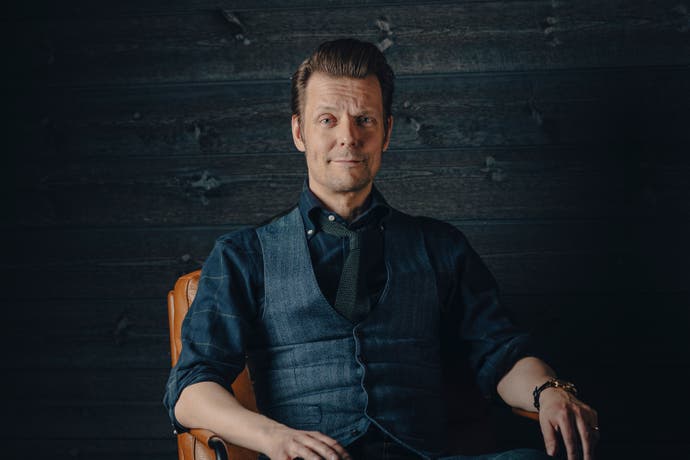

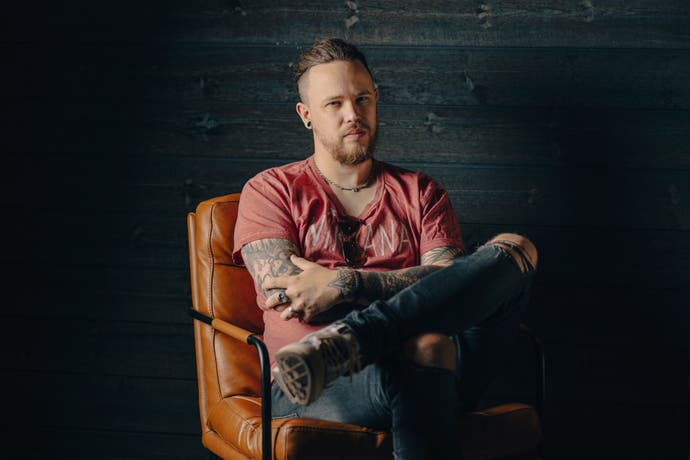
How does it all play? Read my Alan Wake 2 impressions in my hands-on preview.
